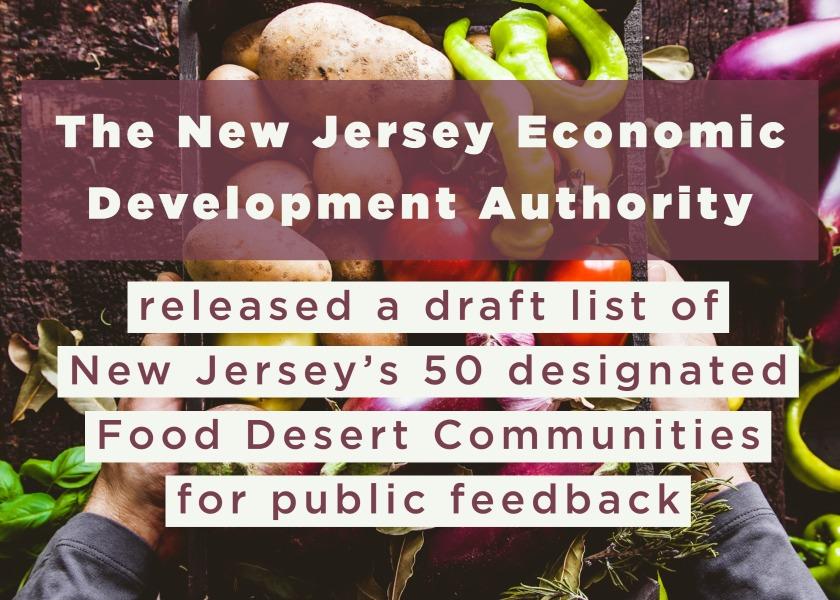The NJEDA releases draft list of New Jersey’s 50 designated Food Desert Communities for public input

The New Jersey Economic Development Authority (NJEDA) today released a draft list of New Jersey’s 50 designated Food Desert Communities for public feedback. Over the next several years, up to $240 million in funding through the Food Desert Relief Act, part of the Economic Recovery Act (ERA) signed into law by Governor Phil Murphy in January 2021, will be available to the designated communities. The draft Food Desert Community designations were developed in partnership with the New Jersey Department of Community Affairs (NJDCA) and the New Jersey Department of Agriculture (NJDA), along with input from the New Jersey Department of Human Services (NJDHS) and New Jersey Department of Health (NJDOH). Anyone wishing to provide feedback can visit https://www.njeda.com/program-specific-feedback to offer input before February 4, 2022. The NJEDA will host listening sessions on January 12 (register here) and January 13, 2022 (register here) to solicit stakeholder input.
The Food Desert Relief Act directs the NJEDA to address the food security needs of communities across New Jersey by providing up to $40 million per year for six years in tax credits, loans, grants, and/or technical assistance to increase access to nutritious foods and develop new approaches to alleviate food deserts. The Act strives to facilitate development, construction, and sustainable operations of new supermarkets and grocery stores within designated Food Desert Communities. It also aims to strengthen existing community assets by arming them with the necessary equipment and infrastructure to provide healthier food options. Additionally, it is designed to help food retailers respond to the shift to e-commerce, including for the Supplemental Nutrition Assistance Program (SNAP) and the Special Supplemental Nutrition Program for Women, Infants and Children (WIC).
“We have an obligation as state leaders, and as human beings, to ensure that no New Jerseyan goes to bed hungry, regardless of their socioeconomic status,” said Lt. Governor Sheila Oliver. “By crafting one of the most comprehensive food desert designations in the country, we are leading the nation in taking necessary steps to eradicate food deserts and remove the barriers keeping our state’s residents from accessing nutritious food.”
According to recent data from the Community Food Bank of New Jersey, 800,000 New Jersey residents face hunger every day. Feeding America noted that 192,580 New Jersey children – one in 10 – face hunger. The number of individuals receiving NJ SNAP (formerly known as food stamps) benefits rose more than 15 percent, from 769,331 in September 2020 to 887,467 in September 2021, according to data from the NJDHS.
“Far too often, hunger hides in plain sight. It is incumbent upon us to shine a spotlight on this all-too-prevalent issue while also bringing much-needed relief to the hundreds of thousands of New Jerseyans that are affected by food insecurity,” said Assembly Speaker Craig Coughlin “The NJEDA’s comprehensive designation of New Jersey’s food desert communities is an important step in this process.”
Together with its partner agencies, the NJEDA issued a Request for Information (RFI) in March 2021 to solicit insight into food security challenges faced by communities across the Garden State, including specific obstacles and disparities within communities that are considered “food deserts.” The RFI also asked for feedback on specific criteria for the Food Desert Communities designation. The recommendations announced today included feedback received through the RFI process and input compiled from research and from other public-sector organizations. The comprehensive designation includes consideration of factors such as: food retail environment, demographics, economic indicators, and health indicators.
The draft 50 Food Desert Communities include a diverse range of communities in every county across the state.
“We are proud to unveil a robust definition of a Food Desert Community that is both reflective of the unique context of New Jersey and supportive of the hundreds of thousands of individuals affected by hunger every day,” said NJEDA Chief Executive Officer Tim Sullivan. “Today’s action to share the draft Food Desert Community designations with the public is the latest in a series of steps Governor Murphy’s administration is taking to eliminate hunger within the Garden State.”
Sullivan noted that, under Governor Murphy’s leadership, the NJEDA launched the innovative Sustain & Serve NJ program early last year. Sustain & Serve NJ grew from a $2 million pilot program designed to support New Jersey’s restaurant industry and strengthen food security into a $45 million initiative on track to support the purchase of 4.5 million nutritious meals from over 400 restaurants in all 21 counties. The meals are purchased, then distributed for free to residents throughout the state. To ensure the program benefits New Jersey’s small restaurants, participating establishments must have 50 or fewer employees.
In November, the NJDA announced that $10 million in American Rescue Funds were being provided to community food banks throughout the state.
“Food insecurity is an ongoing crisis and gathering public input to solidify the Food Desert Communities designations will help connect residents facing hunger with fresh farm products grown and produced at many of New Jersey’s 10,000 farms,” NJDA Secretary Douglas Fisher said.
The NJEDA encourages members of the public that have questions about the Food Desert Community designations, or who would like to provide input, to provide feedback at https://www.njeda.com/program-specific-feedback or email fooddesertrelief@njeda.com.
The Food Desert Relief Act is part of the New Jersey Economic Recovery Act of 2021 signed into law by Governor Murphy in early 2021. In addition to the Food Desert Relief Act, the ERA creates a suite of programs that includes tax credits to incentivize job creation, new construction, and revitalization of brownfield properties; financial resources for small businesses; historic property reinvestment; new funding opportunities for early-stage companies in New Jersey; and support for the growing film and digital media industry. The NJEDA will continue to engage the public as new programs and rules are developed.







